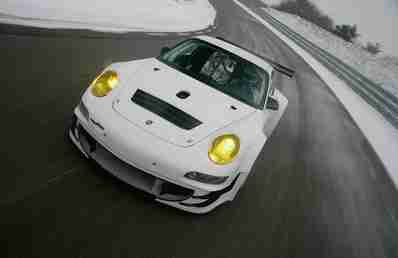 The most powerful race car based on the Porsche 911, which
last season secured wins in the American Le Mans Series and at the
Nürburgring 24 Hours, competes in the GT2 class at international long
distance races. The most distinguishing feature of the new GT3 RSR is the
redesigned front with large air outlets on the front hood. Under the light-weight
bodyshell, as well, major changes were made to the quickest 911. Noticeable
at first sight are the air outlet slots, or the so-called louvers, on the
front hood: an indication of the completely redesigned air ducting of the
radiators, which became necessary through the new design of supply and discharge
air with the installation of an optional air-conditioning unit. The aerodynamics
under the rear underwent further optimisation. The rear wing now features
a wider adjustment range. The weight-optimised brake system and the lighter
wiring harness contribute to further improved handling, compared to the
predecessor model. The capacity of the well-known six-cylinder boxer engine
increased from 3.8 to 4.0-litres.
After another
reduction in the size of the air restrictors for the 2009 season, the engine
now delivers around 450 hp (331 kW) at 7,800 revs per minute and develops
a maximum torque of 430 Nm at 7,250 rpm. The rev limiter of the efficient
six-cylinder unit kicks in at 9,000 rpm. Compared to the forerunner, the
rev level for a given power output was significantly lowered. Thanks to this,
the engine features an optimised torque curve and offers better driveability. The most powerful race car based on the Porsche 911, which
last season secured wins in the American Le Mans Series and at the
Nürburgring 24 Hours, competes in the GT2 class at international long
distance races. The most distinguishing feature of the new GT3 RSR is the
redesigned front with large air outlets on the front hood. Under the light-weight
bodyshell, as well, major changes were made to the quickest 911. Noticeable
at first sight are the air outlet slots, or the so-called louvers, on the
front hood: an indication of the completely redesigned air ducting of the
radiators, which became necessary through the new design of supply and discharge
air with the installation of an optional air-conditioning unit. The aerodynamics
under the rear underwent further optimisation. The rear wing now features
a wider adjustment range. The weight-optimised brake system and the lighter
wiring harness contribute to further improved handling, compared to the
predecessor model. The capacity of the well-known six-cylinder boxer engine
increased from 3.8 to 4.0-litres.
After another
reduction in the size of the air restrictors for the 2009 season, the engine
now delivers around 450 hp (331 kW) at 7,800 revs per minute and develops
a maximum torque of 430 Nm at 7,250 rpm. The rev limiter of the efficient
six-cylinder unit kicks in at 9,000 rpm. Compared to the forerunner, the
rev level for a given power output was significantly lowered. Thanks to this,
the engine features an optimised torque curve and offers better driveability.
In the cockpit, a new multi-function display located above the dashboard
indicates the opti-mum moment to change gears. Another new feature is the
programmable multi-function, onboard supply system control device, giving
teams the choice of many individual functions. One of these is the infinitely
adjustable blinking frequency of the lights in the front apron, which helps
to immediately recognise race cars when they enter the pits in the dark.
For eas-ier servicing under race conditions, other modifications were made.
The GT3 RSR now fea-tures a new air-jack system with overpressure valve.
The oil refill with fast filling function has now moved to the rear lid,
giving mechanics better access. Aside from GT3 Cup and the GT3 Cup S, the
GT3 RSR is the third race car based on the Porsche 911 offered by Porsche
Motorsport. About 20 of the successful long distance racers have been built
in Weissach and are now being delivered to customer teams around the world.
The GT3 RSR costs 380,000 Euro plus VAT specific to each country.
Technical Description Porsche GT3 RSR (2009)
Engine:
Water-cooled, six-cylinder boxer engine; four valves per cylinder; dry sump
lubrication; individual throttle butterflies; fuel injection; air restrictors
2 x 29.5 mm.
Bore: 102.7 mm
Stroke: 80.4 mm
Capacity: 3,996 cc
Power output: 331 kW (450 bhp) at 7,800 rpm
Max. Torque: 430 Nm at 7,250 rpm
Max. revs: 9,400 rpm
Transmission:
Six-speed gearbox with sequential jaw-type shift; oil/water heat exchanger;
single-mass flywheel; hydraulic disengagement lever; three-plate carbon-fibre
clutch; rear wheel drive; limited-slip differential 45/65%.
Body:
Monocoque body (basis GT3 RS) of hot-galvanised steel; aerodynamically optimised
front end with front spoiler; aerodynamically optimised front underfloor;
adjustable rear wing; 90-litre safety fuel tank with fast filling function;
air jack; welded-in safety cage; bucket-type racing seat (on driver's side
only) with flame-resistant seat cover; six-point seat belt adapted for use
of the HANS Head and Neck Support; electric fire-extinguishing system.
Suspension:
Front: McPherson spring strut axle; Sachs four-way gas pressure dampers;
double coil springs (main and ancillary spring); front axle arms adjustable
for camber; adjustable sword-type anti-roll bar on both sides; power steering.
Rear: Multi-arm axle with rigidly mounted axle sub-frame; Sachs four-way
gas pressure dampers; double coil springs (main and auxiliary spring); rear
axle tie-bar reinforced and infinitely adjustable; adjustable sword-type
anti-roll bar on both sides. Complete suspension infinitely adjustable (height,
camber, track).
Brakes:
Brake system with balance bar control. Front: Single-piece six-piston aluminium
fixed callipers; inner-vented, 380 mm in diameter; racing brake pads. Rear:
Single-piece four-piston aluminium fixed callipers; inner-vented, 355 mm
in diameter; racing brake pads.
Wheels:
Front: Three-piece BBS light-alloy wheels (11J x 18-34); central bolt; Rear:
Three-piece BBS light-alloy wheels (13J x 18-12.5); central bolt.
Electrical System:
Motec display with integrated data recording; multi-function display with
integrated gearshift indicator; adjustable traction control; battery: 12
volt, 50 Ah, 140 Ah alternator.
Weight:
Approx. 1,220 kg complying with A.C.O. regulations, 1,245 kg complying with
FIA regulations. |